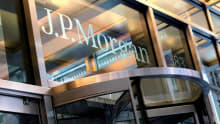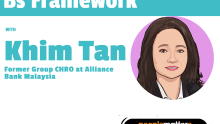Yeo's Angelina Chua on future of talent acquisition

Angelina Chua is First Vice President & Group Head of Human Resource at Yeo Hiap Seng, a Singapore listed food & beverage conglomerate with a global network. Angelina leads its Group Human Resource, General Insurance and Data Protection functions for the Group. She has been instrumental in leading the people transformation at Yeo's. Under her leadership, Yeo's was named Top 100 Asia's Best Employer Brands 2019 and had won several HR awards and mentions at the Singapore HR Awards.
Angelina was conferred the Leading HR Leader at the Singapore HR Award 2019. Before Yeo's, Angelina was the Asia Pacific Head of Human Resource & Administration for Oshkosh Corporation, a Fortune 500 MNC. In an interaction with People Matters, Angelina, throws light on the evolution of talent acquisition models and mantras, recruitment and hiring in the age of AI, and strategies they follow at Yeo's.
Here are the excerpts of the interview.
How do you think has HR evolved over the years and how do you see the role of HR as a business partner?
Over the years, I see HR as having evolved into a multi-faceted function where it is no longer adequate to be a subject matter expert within the HR domain. With businesses getting disrupted and technology playing an increasingly huge role in peoples' lives, the People function has never been more critical than ever. HR could only partner the business well by gaining insights and a good understanding of the disruptors impacting the industry and the people in the business. In essence, HR professionals need to continually broaden our skills and knowledge beyond human resource to elevate the function to be able to bring value to the business. I also see HR progressing from a backend support function to not only just a business partner but an agile business partner to the business leaders in driving business growth. For instance, in our organization, our Group CEO is a firm believer that people are our greatest assets, and he attributes the success of our organization to our employees. I too believe in this, and the value multi-skills HR can bring to the business in today's highly competitive business environment. In a strong partnership, HR's role will be to partner the business in tandem to drive and deliver business successes with the business leaders together.
Do you think companies need to address outdated talent acquisition strategies and focus on training, automation, upskilling and nurturing existing talent?
Traditional talent acquisition strategies were passive. In today's highly connected digital world, candidates are much savvier and they know how to leverage on technology with regard to job searches. Data availability has also increased significantly. The levels of engagement with prospective candidates need to be much higher as compared to the past. Besides focusing on keeping up to date with the talent market trends and creating a mobile engagement platform, the nurturing of existing talents is pertinent to the success of the organization too. To ensure a sustainable talent pool, both hiring from external sources and building from within are equally important. While hiring complements the existing talent pool and strengthens our talent pipelines, building talents from within offer a more integrative approach where our talents progress in the organization. In this region where most countries are facing an aging workforce, there are opportunities in the capitalization of the strengths of our mature workforce. Automation provides training opportunities for talents to focus on higher skills function, and thereby creating higher value to the entire ecosystem.
While hiring complements the existing talent pool and strengthen talent pipelines, building talents from within offers a more integrative approach where talents progress in the organization
How do you see the evolution of recruitment and hiring? What has changed over the years?
Much has changed and it will only get more competitive. With the new generation Z entering the workforce, HR needs to keep innovating on recruiting strategies. HR also needs to be apt in the adaptation of recruiting strategy for the diverse workforce, particularly in the utilization of technology and social media for generation Z. For the first time, we have all five generations of employees working together in the workforce. Employers have to employ a variety of techniques to reach out to the different candidates' pools. From the broader perspective, this presents the challenge of not only in recruiting but more critically in the retention of the talents we bring on-board.
What are the top strategies that you follow at Yeo's to win the war for top talent?
The ultimate goal is to achieve a win-win partnership for both the organization and our prospective employees. The care and attention we put into each hiring process are immense. Each candidate's potential successes in the organization is an integral part of our hiring process. Talent mapping ranks high on our talent agenda. Our consideration encompasses our hiring managers and recruiters having a solid grasp of the candidate's motivation to join the organization as well as their potential career development. The potentials/suitability in the longer term is an important consideration. To win in the talent war, we go beyond the facet of talent acquisition and attraction. From the minute we know that the candidate is going to be an excellent hire for the organization, we are already thinking of how the organization can add value to the candidate's career/portfolio. We see value creation and investing in our employees' career growth as an integral part of our offerings. We define the critical success factor in today's rapidly changing workforce as recognizing that the success of the organization and our people as closely interlinked and mutually beneficial. Our employees' value proposition and employer branding architecture are continually refined to sharpen our focus on hiring the most suitable talent and is a vital part of our overall people strategy.
How can HR organizations leverage the power of agile practices in recruitment and hiring?
Skills are indeed fast-becoming the new professional currency, and agility tops the currency list. More specifically, learning agility is one of the crucial benchmarks when evaluating candidates. In our practices in recruitment and hiring, HR leverage the principles of agile recruiting and work on a sprint cycle to fill the requisition with more frequent touchpoints to achieve faster and greater success in recruiting. HR and the hiring managers work closely to refine the processes and fine-tune the searches. Close collaborations between HR and the hiring managers would define the success of hiring.
What are some of the hiring strategies that you follow at Yeo's to identify soft skills?
Currently, we use an insights tool to identify the skills our existing employees have. To predict what skills for the future, we also analyze industry data. The tool provides excellent insights into talent trends and movements in the industry in terms of the soft skills of prospective employees. Besides looking at the industry trends as a predictor of future skills, we also use behavioral interviewing techniques to identify soft skills.
With Artificial Intelligence set to impact every aspect of HR and talent acquisition in particular, how do you see the rise of next-gen technologies and its role in recruitment?
Organizations have embarked on artificial intelligence and data to enhance and streamline the talent acquisition processes resulting in quicker turnaround time in generating the shortlists to hiring managers and shorter decision-making time. While this is improving the talent acquisition processes, organizations need to upskill not only their HR function but also the hiring managers in understanding how artificial intelligence and data can impact their work daily. These technologies are new to many people, and there is a need to explain and allow people to understand how these new technologies can help to create more efficient processes and in turn, free up their time for more strategic work. The intent and impact of artificial intelligence and automation on work and jobs are for the better but is best understood when explained without assuming. This allows the organization to advance together and create synergies in the adoption of technology.
With all five generations of employees working together in the workforce, employers have to employ a variety of techniques to reach out to different candidate pools
What aspects of talent acquisition do you plan to improve or implement in the coming year?
Talent acquisition success is synonymous with good employer branding. We first started running employer branding campaigns last year and have so far seen success in these campaigns. These success stories have been truly inspiring, and we will be continuing works in this area. Now that we have built a strong foundation, we see ourselves moving to a series of innovative campaigns and are excited to roll these out in the coming months. We will continue to build on our brand visibility, focus on branding efforts and actively engaging talents. Besides, we are currently looking at predictive talent analytics which will see the talent acquisition function leveraging on the availability of data acquired through technology advances. To progress in talent acquisition, this involves the transformation of the talent acquisition function from traditionally passive responding to requests type of role to a proactive function and thereby increasing its influence on what the business needs.
What's the future of talent acquisition?
With technological advancement fast-changing every workplace, the future of work, along with the future of HR and recruiting skills, will continually evolve. The recruiting function will be a dynamic one with changing models for work and work structure impacting the future of talent acquisition. While AI and data aid in the initial short-listing stage and can save time, it could only be as robust as the quality of the source data. Therefore, recognizing that there are still values in evaluating the candidates in an interactive setting is essential. The gig economy might also be a supplementary source of talents for organizations. Besides thinking about the talent pool and innovating our talent acquisitions processes, the social media engagement with the talent pools would be a trend. It could be as frequent and intense as how our marketing peers would be engaging with consumers.















